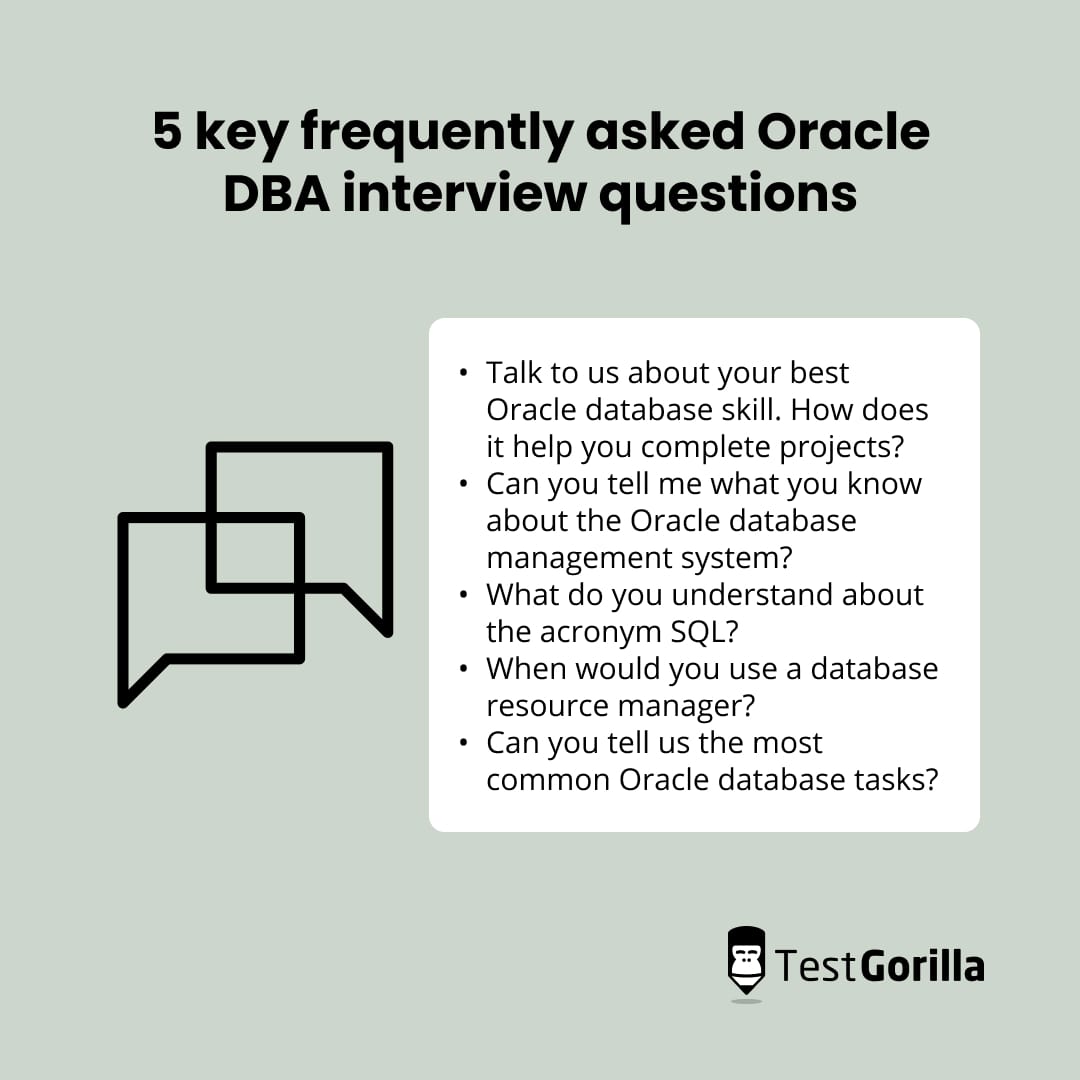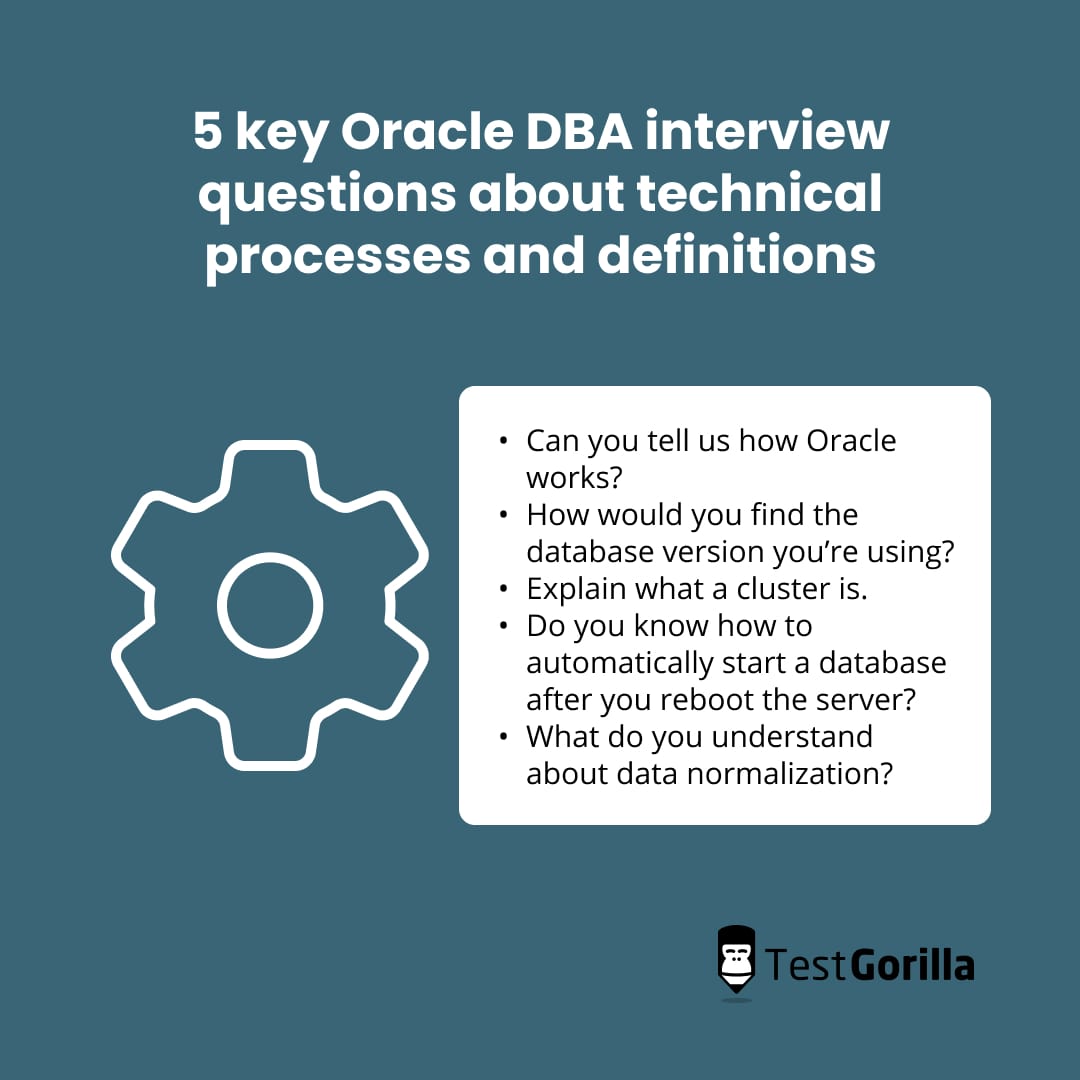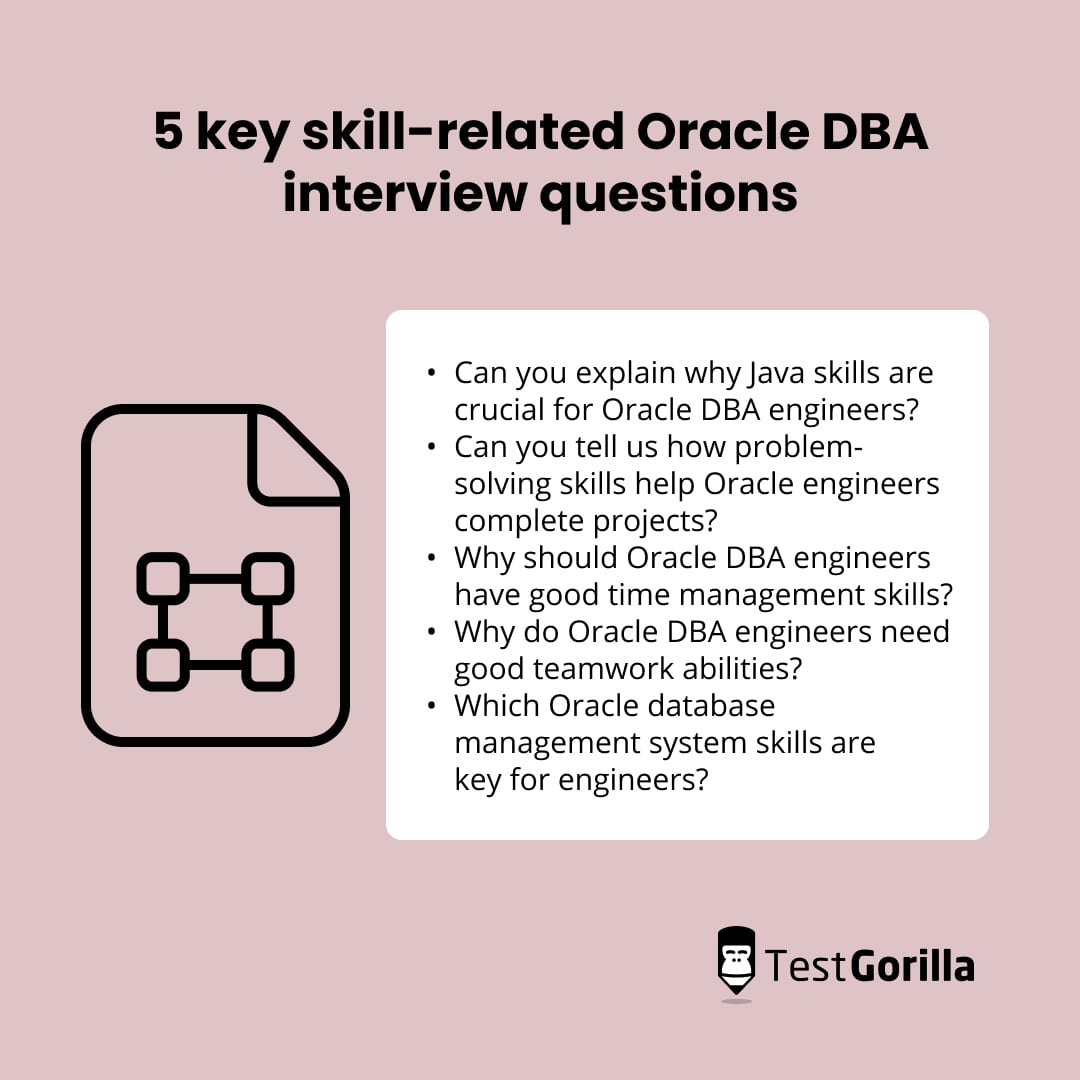74 Oracle DBA interview questions to ask your candidates
As one of the most popular database management systems for data storage and manipulation, Oracle is critical for any business aiming to leverage data for applications.
Organizations large and small require Oracle database administrators to access, manage, and process raw data, so finding the right Oracle engineer is essential to achieving data-driven results.
Implementing a multi-step hiring process will help you assess candidates thoroughly. Use an Oracle DBMS test as part of a skills assessment, and then ask candidates Oracle DBA interview questions in an interview.
Use some of the 74 Oracle DBA interview questions below to learn more about your candidates.
Table of contents
- 12 frequently asked Oracle DBA interview questions to ask engineers
- 5 key frequently asked Oracle DBA interview questions and sample answers
- 52 Oracle DBA interview questions about technical processes and definitions
- 5 key Oracle DBA interview questions about technical processes and definitions with sample answers
- 10 skill-related Oracle DBA interview questions to ask interviewees
- 5 key skill-related Oracle DBA interview questions and sample answers
- For which roles can you use our Oracle DBMS skills test, and when should you use it?
- Use Oracle DBA interview questions to hire a professional system engineer
12 frequently asked Oracle DBA interview questions to ask engineers
The following frequently asked Oracle DBA interview questions will help you establish the right tone for the interview. Ask candidates a few questions to test their general knowledge of Oracle.
1. Can you tell me what you know about the Oracle database management system?
2. Talk to us about your best Oracle database skill. How does it help you complete projects?
3. Can you tell us the most common Oracle database tasks?
4. Tell me how EBU and RMAN differ. What do they do?
5. What do you understand about ASM instances?
6. Should engineers back up any specific files when using Oracle?
7. When would you use a database resource manager?
8. Do you know what storage virtualization means? Can you define it?
9. Can you explain what a tablespace is?
10. Can you tell us what a control file is?
11. What do you understand about the acronym SQL?
12. Do you know how many backup types exist in Oracle?
5 key frequently asked Oracle DBA interview questions and sample answers
When reviewing your database administrator’s responses, check the sample answers to these five frequently asked Oracle DBA interview questions.
1. Talk to us about your best Oracle database skill. How does it help you complete projects?
Although 93% of hiring managers expect candidates to have database administration skills, not every applicant will mention this ability when responding to this question. Your candidates might mention other technical skills, such as SQL or PL/SQL programming abilities, which help them develop modular programs in Oracle.
The simplest way to review your candidates’ responses is to consider if their best skill matches the must-have skills listed in your job description. You should also give them a programming skills test like our SQLite test to quickly find top applicants.
2. Can you tell me what you know about the Oracle database management system?
The best responses to this Oracle DBA interview question will explain that Oracle DBMS is a relational database management system (RDBMS). It’s the most popular database management system worldwide.
Take note of any applicants who also mention that Oracle helps engineers retrieve and store large amounts of data.
Don’t forget to review your candidates’ experience using Oracle databases to complete projects. If applicants have the right experience, they’ll know it’s ideal for mixed database workloads and transaction processing.
3. What do you understand about the acronym SQL?
All candidates should know that SQL is an acronym for Structured Query Language. They should have no problem explaining that this programming language helps engineers store and manipulate data in RDBMSs.
The top answers will mention a few advantages of SQL, such as its:
Standardized status
Interactive features
Rapid query processing features
If you want to review your candidates’ SQL knowledge, use our handy SQLite skills test to assess your applicants efficiently.
4. When would you use a database resource manager?
A database resource manager is ideal for limiting user sessions’ idle time. They’re also useful for terminating long-running SQL statements.
If you want to learn more about your candidates’ knowledge of Oracle, check if they know how the database resource manager works. Applicants should know that the system manages the CPU and mitigates thrashing. Developers can also configure a resource manager with the caging instance.
5. Can you tell us the most common Oracle database tasks?
Candidates who have used Oracle will know some of the key tasks that programmers complete with this database. Here are a few examples they may mention:
Database upgrades
Database storage structure management
User and security management
Database backups
It’s a good idea to check if your candidates have recent experience completing these tasks and understand why they’re important.
For example, security management can help protect company or client data, and user security can protect accounts from unauthorized access. These actions are crucial: The average cost of a data breach in the US is $9.4m.
The best insights on HR and recruitment, delivered to your inbox.
Biweekly updates. No spam. Unsubscribe any time.
52 Oracle DBA interview questions about technical processes and definitions
Assessing your Oracle administrator candidates’ technical knowledge is critical for hiring skilled engineers. Ask them some of these Oracle DBA interview questions to gauge their technical experience and knowledge of definitions.
1. How is Oracle DBA different from Oracle Developer?
2. Can you explain how you would find out what privileges your users have?
3. Do you know what a control file contains?
4. Can you name five tools engineers can use to administer the database?
5. Name three dictionary tables engineers use to monitor database spaces.
6. Can you describe the disk resources’ logical structure?
7. Can you explain what parameter files are?
8. Do you understand what redo log files are? Can you tell us what they do?
9. Can you explain the two main data file properties?
10. Can you explain what the ORDER BY clause does in Oracle DBA?
11. Do you know what some of the common SQL statements are? Can you name them?
12. Can you explain what data files are in Oracle DBA?
13. Can you explain what the SELECT DISTINCT statement does in Oracle DBA?
14. Can you name five Oracle database objects?
15. Do you know how to automatically start a database after you reboot the server?
16. Name the required components for creating sequences.
17. Can you explain what a grid model is?
18. Explain what a cluster is.
19. Do you understand how the database writer functions in Oracle?
20. Can you tell us how you would switch from an init.ora file to spfiles?
21. What do you understand about data normalization?
22. Do you understand what a sequence is and how to create one?
23. Can you explain what materialized view means?
24. What does the count function do in Oracle records?
25. What does the count(*) function do in Oracle records?
26. Can you explain what a public database link is?
27. Tell us what the GROUP BY clause does in Oracle.
28. Can you define transactions and explain what they do in Oracle?
29. What do you understand about shared server architecture?
30. What do you understand about indexes?
31. Do you know what a sequence generator is in Oracle?
32. Do you know what a dimension is in Oracle?
33. Can you tell us how Oracle works?
34. Can you explain how engineers use views in Oracle?
35. Do you know what an Oracle instance is? Can you give us a definition?
36. Can you tell us when Oracle allocates an SGA?
37. Do you understand what data blocks are? Can you give us a definition?
38. Can you tell us what server virtualization is?
39. What are synonyms in Oracle? What do they do?
40. Do you understand what rollback segments are?
41. Can you explain what archiver processes are?
42. What do you understand about job queue processes?
43. Can you tell us what you know about large dedicated servers?
44. List the tools you would use to set up an Oracle database.
45. Can you name three database components you can protect with Oracle Restart?
46. What do you understand about resource plans?
47. Tell us what you know about recovery catalogs.
48. How would you find the database version you’re using?
49. Explain how you would develop response files to make database installations faster.
50. Can you explain what table dropping means?
51. Tell us what table truncating means.
52. Can you explain what deleting database table records means?
5 key Oracle DBA interview questions about technical processes and definitions with sample answers
After receiving responses, check these five sample answers to some of the most important Oracle DBA interview questions for a streamlined review of candidates’ knowledge.
1. Can you tell us how Oracle works?
Answering this Oracle DBA interview question can be quite challenging for applicants, but they’ll easily prove their expertise if they have the right technical knowledge.
The globe generates 2.5 quintillion bytes of data daily, much of which is stored using Oracle. But how does this database management system work? You can expect candidates to list the following steps to Oracle’s operation:
The database server starts an instance
A client creates a connection to the server
The server initiates a dedicated server process
The user executes a SQL statement and completes a transaction
The server receives the SQL statement and checks for any shared SQL areas
The server takes data from the table or data file
The server makes modifications to the data
Database processes write modified blocks
The system records the transaction
The server notifies the application
The outcome of these steps is that engineers can design databases, ensure they retrieve the correct information, and execute operations successfully.
2. How would you find the database version you’re using?
Since engineers can reap the benefits of many of Oracle’s features by knowing the database version they’re using, candidates should understand how to find this information. And it’s not a complex process – all they need to do is run a query using the command prompt.
Applicants should know that the command they should use is:
SELECT * FROM V$VERSION
Some expert candidates might also know that the V$VERSION table contains the required database version information, which is why the command features the V$VERSION syntax.
3. Explain what a cluster is.
A cluster is a type of schema object. It features data from several tables that share a common column. Top applicants might also show their proficiency by explaining that the database stores all rows of tables together if they share the same cluster key.
The candidates with the most knowledge may even explain how they would create a cluster using the CREATE CLUSTER statement and using a schema to contain the cluster.
4. Do you know how to automatically start a database after you reboot the server?
Engineers must complete a manual start when the server reboot ends to initiate their database automatically. Fortunately, they can use a couple of methods to start it automatically:
Use a script:
Engineers can write a script by putting it at the beginning of the operating system so that it initiates the automatic restart
Use Oracle Restart:
This Oracle high-availability service works with the CRSCTL utility to start databases, automatic storage management (ASM) instances, and listeners
5. What do you understand about data normalization?
Normalization is a process data engineers use to reorganize data in a database. The best candidates will know that data normalization refers to the process of organizing data to reduce redundancy and improve the data’s integrity.
Candidates who know that the processed data is clean and free from redundant or unstructured data may have the knowledge needed for your open role.
10 skill-related Oracle DBA interview questions to ask interviewees
Soft and hard skills can greatly impact your employees’ performance. Ask your interviewees some of these skill-related Oracle DBA interview questions to learn about their abilities.
1. Is attention to detail a useful skill for Oracle DBA engineers? Explain your answer.
2. How important are communication skills for Oracle DBA engineers? Explain your answer.
3. Are analytical skills important for Oracle DBA engineers?
4. Can you explain why Java skills are crucial for Oracle DBA engineers?
5. Tell us why C++ skills are handy for Oracle DBA engineers.
6. Which Oracle database management system skills are key for engineers?
7. Can you tell us how problem-solving skills help Oracle engineers complete projects?
8. How is critical thinking crucial for Oracle DBA engineers?
9. Why should Oracle DBA engineers have good time management skills?
10. Why do Oracle DBA engineers need good teamwork abilities?
5 key skill-related Oracle DBA interview questions and sample answers
As you look over your candidates’ answers, review them against the sample responses to these five skill-related Oracle DBA interview questions.
1. Can you explain why Java skills are crucial for Oracle DBA engineers?
Oracle is a database management system, and Java is a programming language. But Oracle DBA engineers may need Java skills to write Java applications that can retrieve data from an Oracle database.
Therefore, if your company makes Java applications, you’ll need an applicant proficient in both Java and Oracle.
Accessing an Oracle database with Java requires knowledge of the Java database connectivity API, so it’s a bonus if candidates understand more about this.
If you need to assess your applicants’ Java skills, don’t hesitate to use our Java skills test as an instant candidate-evaluation method.
2. Can you tell us how problem-solving skills help Oracle engineers complete projects?
Oracle DBA engineers can face various challenges, such as issues with user and data security and authenticity. Applicants require advanced problem-solving skills to handle these problems efficiently.
Other challenges include debugging and troubleshooting errors and correctly configuring ASM. Engineers can overcome these issues with expert debugging skills and ASM knowledge.
Don’t forget to assess your applicants’ problem-solving skills with a Problem Solving skills test to learn if their abilities are refined enough for your open role.
3. Why should Oracle DBA engineers have good time management skills?
Every project is time sensitive, and every application production process is subject to deadlines. To satisfy their clients, Oracle DBA engineers must adhere to these deadlines. Applicants should have good time management skills to deliver their applications to clients with minimal delays.
Do you need to learn more about your applicants’ time management skills? Our Time Management skills test is the data-driven tool you need to select the most impressive candidates.
4. Why do Oracle DBA engineers need good teamwork abilities?
Database engineers may need to collaborate with other team members and teams to complete a project. From discussing end-to-end data collection to processing data, their responsibilities require input from their colleagues.
The simplest way to learn about your applicants’ teamwork abilities is to give them follow-up questions.
For example, you might ask them, “Which projects have been successful thanks to your teamwork abilities?” This method can help you get more information from candidates if they provide a brief answer to the original question.
5. Which Oracle database management system skills are key for engineers?
Oracle databases can help engineers complete complex projects. Therefore, they should understand not only database architecture but also storage structure, recovery techniques, and schema objects.
Some other skills you should look for in your engineers include knowledge of backup techniques and database security management. Fortunately, you can assess these Oracle database management system skills with our Oracle DBMS skills test.
For which roles can you use our Oracle DBMS skills test, and when should you use it?
Our Oracle DBMS skills test is ideal for many roles, including system administrators, database engineers, database solution architects, and Oracle database administrators. It’s the best option to quickly assess the following four skills:
Database security management
Database schema objects
Recovery and backup methods
Oracle database architecture
We recommend using the Oracle DBMS skills test before asking Oracle DBA interview questions and after you write a strong DBA job description. With this strategy, you can find out who the best Oracle database administrators are before you invite them to an interview.
Use Oracle DBA interview questions to hire a professional system engineer
Your hiring process can be smooth and streamlined when you use Oracle DBA interview questions to hire a system engineer. But here’s a bonus tip – combine these questions with custom skills tests to easily find top candidates.
All you need to do is ask candidates to complete an Oracle DBMS test as part of a skills assessment and invite the top-performing candidates to an interview.
If you’re looking for expert-crafted skills tests, visit TestGorilla’s test library or tour our product. We’re making hiring simpler – so ensure you reap the advantages of our comprehensive skills tests to find top pros for your team.
You've scrolled this far
Why not try TestGorilla for free, and see what happens when you put skills first.

















